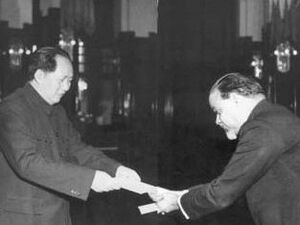K. M. Panikkar facts for kids
Quick facts for kids
Sardar
K. M. Panikkar
|
|
|---|---|
| Ambassador of India to France | |
| In office 1956–1959 |
|
| Preceded by | Hardit Malik |
| Succeeded by | N. Raghavan |
| Ambassador of India to Egypt | |
| In office 1952–1954 |
|
| Preceded by | Asaf Ali Asghar Fyzee |
| Succeeded by | Ali Yavar Jung |
| Ambassador of India to China | |
| In office 20 May 1950 – 12 September 1952 |
|
| Succeeded by | N. Raghavan |
| Personal details | |
| Born | 3 June 1895 Travancore (Modern day Kerala, India) |
| Died | 10 December 1963 (aged 68) Mysore, Karnataka, India |
| Alma mater | Madras Christian College University of Oxford |
| Occupation | Novelist, journalist, historian, administrator, diplomat |
Sardar K. M. Panikkar (born June 3, 1895 – died December 10, 1963) was a very important person in India's history. He was known as a statesman, which means he was a skilled leader in government. He was also a diplomat, someone who represents their country in other nations. Besides that, he was a professor, a newspaper editor, a historian, and a writer!
He was born in a place called Travancore, which was a 'princely state' in India. This means it was ruled by its own prince, but it was also part of the larger British Indian Empire. He studied in Madras (now Chennai) and at the famous University of Oxford in England.
After teaching at universities, he became the editor of the Hindustan Times newspaper in 1925. He also worked for the 'Chamber of Princes', which was a group of Indian rulers. Later, he became a foreign minister and even the Prime Minister for some of these princely states.
When India became independent in 1947, Sardar Panikkar represented the country at the UN General Assembly. He was India's first ambassador to China in 1950. He also served as ambassador to Egypt and France. He was a member of the Rajya Sabha, which is the upper house of India's parliament. He also led two universities as Vice-Chancellor.
Contents
Early Life and Education
Madhava Panikkar was born in 1895 in Travancore. His family belonged to the Nair community. He went to school in Kottayam and Madras. After that, he joined Madras Christian College.
In April 1914, he traveled to England to study history at Christ Church at the University of Oxford. After finishing his studies at Oxford, Panikkar also trained to become a lawyer in London. He was the first president of the Kerala Sahitya Academy, an important literary organization.
Panikkar also traveled to Portugal and Holland to learn about how these countries were involved with Malabar (a region in South India). He wrote two books about his findings: Malabar and the Portuguese (1929) and Malabar and the Dutch (1931).
A Diverse Career in India and Abroad
When he returned to India, K. M. Panikkar first taught at the Aligarh Muslim University and then at the University of Calcutta. In 1925, he started working as a journalist and became the editor of the Hindustan Times newspaper.
For about 20 years, Madhava Panikkar worked for the princely states in India. He became the secretary to the leader of the Chamber of Princes. He also served as the foreign minister for the states of Patiala and Bikaner. In 1944, he became the dewan (a top official, like a prime minister) of Bikaner.

He served as India's ambassador to China until 1952. He was there during a big change when the Communists took over China in 1949. He wrote about his experiences in a book called In Two Chinas (1955). During this time, he also completed his important work, Asia and Western Dominance (1953).
After China, he became the ambassador to Egypt (1952–1953) and then to France (1956–1959). A serious illness made him return to India. After getting better, he went back to his academic work. He became the Vice-Chancellor (a top leader) of Jammu and Kashmir University and later of Mysore University.
Even while working in politics, Panikkar continued to write articles and poems. He also translated several Greek plays into the Malayalam language. From 1959 to 1961, he was a nominated member of the Rajya Sabha, which is a part of India's parliament.
Academics and Scholarship
From a young age, Madhava Panikkar was very interested in Malayalam literature. He was a close friend of the famous poet Vallathol Narayana Menon. He wrote many scholarly books and articles about ancient Indian history and more recent historical events.
A historian from Cambridge, Arthur Hassall, once said that in his long career, he had "never had a more brilliant student" than Panikkar. Madhava Panikkar was interested in many different areas, including art, novels, poetry, and Kathakali (a traditional dance-drama). He wrote very well in both Malayalam and English. He published over 50 books and many articles.
Panikkar was especially interested in how European countries influenced Asia. This interest was clear in his studies of the Portuguese and the Dutch in Malabar. It was also a main theme in his book Asia and Western Dominance (1953). His book In Two Chinas (1955) showed his understanding of Communist China.
Images for kids
-
Panikkar (left) with Vijaya Lakshmi Pandit and Zhou Enlai.
See also
- Navtej Sarna
- Taranjit Singh Sandhu
- Harsh Vardhan Shringla
 | Aurelia Browder |
 | Nannie Helen Burroughs |
 | Michelle Alexander |


